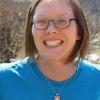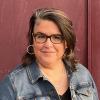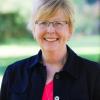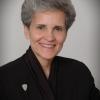"Organic buildings are the strength and lightness of the spiders' spinning . . . ."
Soon after I decided to ask to make my perpetual vows and was approved to do so, I became a bit obsessed with fire. It’s not a dangerous obsession or anything, it’s more that I am paying attention to all the ways that fire images and metaphors are incorporated into our culture and faith. I quickly became fascinated by what I was noticing and how often I heard popular song lyrics and ordinary conversation casually incorporate words like “fire,” “burn,” “spark” or “enflame.” It got me thinking about all the different ways we use the idea of fire – like in St. Francis of Assisi’s Canticle of Creation, where he offers praises to God for “Brother Fire,” for being so bright and lively.
Filo Hirota is a member of the Mercedarian Missionaries of Berriz and its executive coordinator. A native of Japan, Hirota has served there and in the Philippines, Nicaragua and Mexico. Currently she is a board member of the International Union of Superiors General and an executive committee member of Pax Christi International.
From A Nun's Life podcasts - In this Random Nun Clip we talk with Sr. Heather Jean Foltz and Sister Mary Luke Jones about how "just a visit" led to an unexpected vocation with the Beech Grove Benedictines.
"Touch the hearts of those who look only for gain at the expense of the poor and the earth. Teach us to discover the worth of each thing, to be filled with awe and contemplation, to recognize that we are profoundly united with every creature as we journey towards your infinite light."
Her early spirituality shaped in high school by the Sisters of Loretto and her world views molded in the Philippines as a missioner, Maryknoll Sr. Mary Grenough could well be a poster child for a generation of U.S. religious women radicalized in the wake of Vatican II. These women have been as persistent as they have been faithful to their religious callings, many for more than six decades. Grenough is one of nine in her Maryknoll entrance class still in active ministry. She turns a young 82 today, having served nearly 40 years in the Philippines; 10 in Burma (Myanmar).
See for Yourself - My younger sister and I shared a bedroom growing up. In our younger days neither of us was very neat, as evidenced by piles of clothes strewn around the room, books on the floor instead of in the bookcase . . .
Pope Francis’ encyclical,"Laudato Si’, on Care For Our Common Home," unequivocally names human behavior as a major cause of global climate change and urges all sectors of society to examine our actions, policies and behaviors in light of this urgent situation. It speaks to how the cry of the Earth and the cry of the poor are one and that all forms of poverty – environmental and human – need to be addressed in an interconnected way. However, as I read the encyclical I was struck with how it is much more than a moral exhortation on a very complex issue.
The Philippine government’s efforts to implement a peace agreement with the rebel Moro Islamic Liberation Front may have hit another bump in Congress, but on the ground, Missionaries of the Assumption nuns are relentlessly working to forge peace through dialogue. Sr. Marietta Banayo of the Missionaries of the Assumption community in the autonomous region’s Malabang town told Global Sisters Report in late May that the law would bring hope, especially to people in the most underserved areas in Mindanao.
"Now there are varieties of gifts, but the same Spirit. To each one is given the manifestation of the Spirit for the common good. All the members of the body, though they are many, are one body. You are Christ’s body, and individually members of it."






